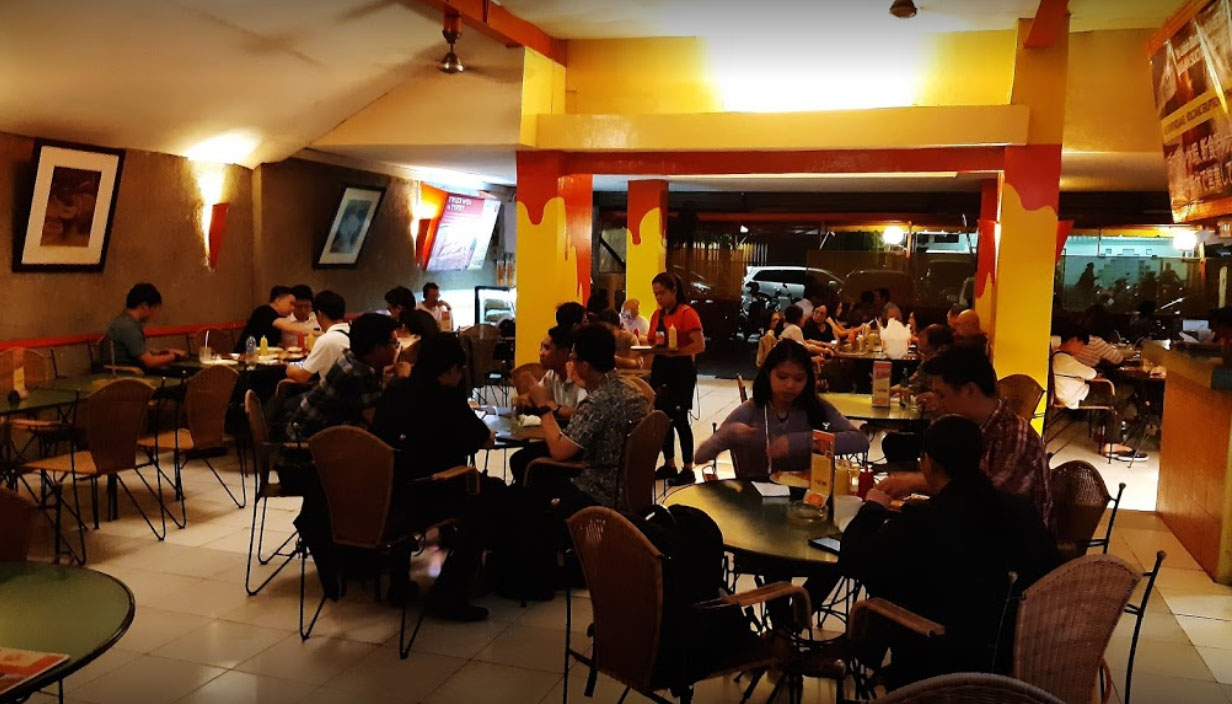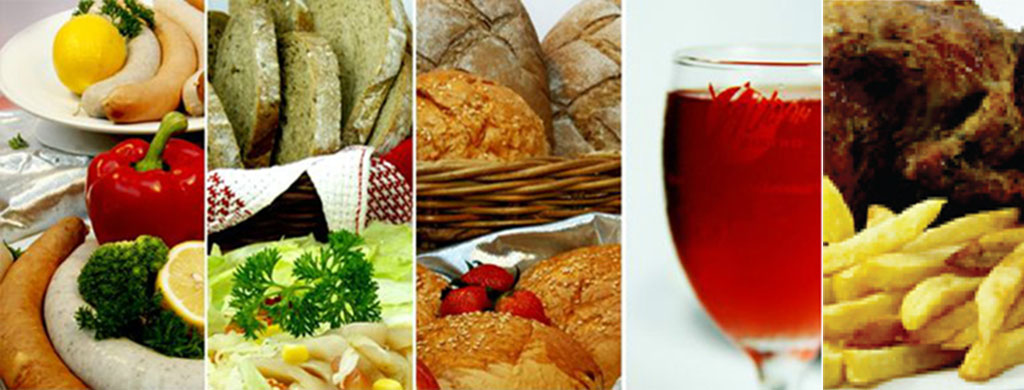AWARDS & AWARDS – ONES YOU CAN & CAN’T TRUST
HEY! Look what happened to us:
Best German bars around the world
Here’s what CNN says about Ya Udah Bistro, nicely enough:
The world’s largest Muslim-populated nation happens to have a German restaurant known for a gigantic hunk of pork. Ya Udah, roughly translated to “alright” in Indonesian, has been serving a four-pound grilled pork knuckle since 2001.
But strict adherence to German tradition isn’t exactly the idea; its voluminous menu lists spaghetti with meat sauce and black pepper stir-fry among the dozens of sausages, roasted meat and cabbage dishes.
That irreverence doesn’t prevent the restaurant from being incredibly popular, and it translates to a politically incorrect vibe that plays out in the orange and yellow space. Case in point, its smoking policy: “For smokers, we salute you: SMOKE! For non-smokers, please: NON-SMOKE!”
Ya Udah Bistro, Jl. Johar 15, Menteng, Jakarta 10350; +62 21 3140343
This is doubly-pleasing (although the Bistro is more than a ‘bar’) because, well, to be perfectly honest about it, Indonesia, for all of its many attractions, is really not exactly at the top of places visited around the world, for a number of reasons (some murky).

The late Indonesian Minister of Tourism Joop Ave was once reported as complaining ‘I was at a convention of travel agents and one man asked me where I was from. “Indonesia” I answered, and he smiled “Oh that’s in Bali, isn’t it?”’
Now CNN will have no ‘ulterior motive’ to praise us, along with the Brazilian, South African, European and Japanese lovers of Deutsches Essen und Trinken.
The payoff? Ya Udah Bistro is for real.
Still, it’s not surprising a lot of internet-addicts have become cynical about any sort of recommendation.
Time and again recommendations and awards have been busted: somebody took some money, or a free trip to an exotic location, or was stroked for political reasons, giving rise to finger-pointing and victorious mirth.
Imagine giving a Nobel Peace Prize to a realpolitik operator like this mass-murderer.

Mr Kissinger, 93, was awarded the Nobel Peace Prize in 1973 for his efforts to conclude the Vietnam War. The award was described by critics as a move which “made political satire obsolete”.
Here’s some background, from the Nobel Prize Committee itself:
Christmas 1972 saw heavy bombing raids carried out over the North Vietnamese capital Hanoi by American B-52 bombers. All over the world, thousands of people took to the streets in protest. The man who ordered the bombing was at the same time spearheading cease-fire negotiations. The armistice took effect in January 1973, and the same autumn Henry Kissinger was awarded the Peace Prize together with his counterpart Le Duc Tho. The latter refused to accept the Prize, and for the first time in the history of the Peace Prize two members left the Nobel Committee in protest.
Such a blatantly political action definitely dulled the shine on that formerly prestigious award.

Ditto for awarding a Nobel Peace Prize to President O-Bomber as he was waging war all over the world, attacking seven countries in six years.

A Nobel Peace Prize for this?
One apologetic explanation was that the prize was not for the actual achievement of peace but rather to influence the recipient to be, well, a little more peaceful.

The opposite to a Nobel Prize would be an Ig-Nobel Prize, awarded humorously to the most useless ‘improbable scientific research’ imaginable:
Biology – Robert Klark Graham, selector of seeds and prophet of propagation, for his pioneering development of the Repository for Germinal Choice, a sperm bank that accepts donations only from Nobellians and Olympians. (So NO they don’t want your worthless jism. Put it back in your pants.)
Art – Presented jointly to Jim Knowlton, modern Renaissance man, for his classic anatomy poster “Penises of the Animal Kingdom,” and to the U.S. National Endowment for the Arts, for encouraging Mr. Knowlton to extend his work in the form of a pop-up book. (Governments really give money for this kind of research. No, really.)
Chemistry – Ivette Bassa, constructor of colourful colloids, for her role in the crowning achievement of 20th century chemistry, the synthesis of bright blue Jell-O. (The color of deadly poisonous deep-sea organisms.)
Economics – Presented to Ravi Batra of Southern Methodist University, shrewd economist and best-selling author of The Great Depression of 1990 (ISBN 978-0-440-20168-7) and Surviving the Great Depression of 1990, (ISBN 978-0-671-66324-7) for selling enough copies of his books to single-handedly prevent worldwide economic collapse. (Nice scam ya got goin’ for ya, Prof…)
Medicine – Presented to James F. Nolan, Thomas J. Stillwell, and John P. Sands, Jr., medical men of mercy, for their painstaking research report, “Acute Management of the Zipper-Entrapped Penis”. (Ouch. And more Ouch.)
Peace – The Pepsi-Cola Company of the Philippines, for sponsoring a contest to create a millionaire, and then announcing the wrong winning number, thereby inciting and uniting 800,000 riotously expectant winners, and bringing many warring factions together for the first time in their nation’s history. (Everybody wins!!)
Economics – Presented to Juan Pablo Dávila of Chile, tireless trader of financial futures and former employee of the state-owned company Codelco, for instructing his computer to “buy” when he meant “sell”. He subsequently attempted to recoup his losses by making increasingly unprofitable trades that ultimately lost 0.5 percent of Chile’s gross national product. Davila’s relentless achievement inspired his countrymen to coin a new verb, “davilar“, meaning “to botch things up royally”. (Really, it’s only money.)
Literature – Presented to L. Ron Hubbard, ardent author of science fiction and founding father of Scientology, for his crackling Good Book, Dianetics, which is highly profitable to mankind, or to a portion thereof. (Scary dude. Lucky dude’s dead, duds left behind.)
Medicine – Two prizes. First, to Patient X, formerly of the US Marine Corps, valiant victim of a venomous bite from his pet rattlesnake, for his determined use of electroshock therapy. At his own insistence, automobile spark plug wires were attached to his lip, and the car engine revved to 3,000 rpm for five minutes. Second, to Dr. Richard C. Dart of the Rocky Mountain Poison Center and Dr. Richard A. Gustafson of The University of Arizona Health Sciences Center, for their well-grounded medical report, “Failure of Electric shock Treatment for Rattlesnake Envenomation.” (I’d like to simultaneously nominate him for a Darwin Award.)
These were unintentionally humorous. Getting into the spirit of things,
The “Parade of Ignitaries” into the hall includes supporting groups. At the 1997 ceremonies, a team of “cryogenic sex researchers” distributed a pamphlet titled “Safe Sex at Four Kelvin.” Delegates from the Museum of Bad Art are often on hand to display some pieces from their collection.

There is a long and distinguished history of corrupt promotions, ‘awards’ given in exchange for money, gifts or favors. We even coined a new word coined for it: ‘Payola’.
Fast-forward to the age of the internet.

The internet and massive global tourism – so whose recommendation do you follow when choosing a hotel, resort or restaurant abord – particularly to a country which you’ve never visited?
Well, you start off with the internet and its overflowing cornucopia of rich attractions – but hey wait a minute, Cowboy –
It

Is
The

Internet, Rhett!

Hoaxes may be harmless – although recent fake Coronavirus blabber has alarmed and confused a lot of already alarmed and confused people swirling around the ‘infodemic’.
Similarly, recommendations should be treated with great caution when popping up on the worldwide web. You read a glowing review – but wait a minute, you have no idea who is ‘recommending’ a restaurant, hotel or attraction, or whether they were paid to promote it. Who is going to prosecute a liar on the web?
Why would you take the advice of a strange website about where to go, with a fervent recommendation that may or may not be >ahem< ‘accurate’. In other words, they are throwing fakes, hoaxes and pay-for-play at you, every day, all day long.
Take www.tripadvisor.com , one of the most successful of all the travel websites. I bet half my esteemed readers have logged onto tripadvisor at one point or another, without realizing that Stephen Kaufer, its CEO, declared an income of forty million dollars for his ‘free’ website. Where does the money come from? Well one woman is on the warpath against misleading, exaggerated or fake promotions, and does she grind her axe.
Get this:
Regardless of the fact that it is riddled with fakes and idiots, a huge number of otherwise sensible people continue to give credence to the aggregated opinion of, at best, unqualified strangers. A 2015 government-backed Competitions & Markets Authority investigation found that UK consumers spend more than £23bn a year after reading online reviews. “Only a very small proportion [of respondents] felt that it was ‘not very likely’ or ‘not at all likely’ that the reviews were written by genuine customers,” the report concluded.
She definitely has a point, as any seasoned [disappointed] traveler can confirm. You could even inadvertently put yourself in danger, taking an ‘award-winning’ recommendation, as Marina O’Loughlin points out:
I hate the implicit pressure: on small businesses to sign up or pay the price, to put buttons on websites and stickers on doors, the fact that even the inadvertent user is bulldozed into downloading the wretched bloody app. I hate TripAdvisor because the top listing in one Italian town was utterly fictitious. Because it gives awards to hotels like the Tunisian one closed months earlier after 38 holidaymakers were shot dead. Because there is a whole industry dedicated to churning out fake, by-the-yard “reviews”.
OK, how’s about a neutral source, awarding a surprise review to our own YaUdah Bistro in a CNN travel review entitled ‘Best German bars around the world’. How amazing.
Meanwhile, back at CNN, we go traveling around the planet to wine and dine Teutonic-style. In its praise for Ya Udah Bistro and its fellows in faraway lands, the travel piece elaborates:
But there’s more to the country than the Bavarian standard of pale brews and a wooden slab of sausages with mustard and rye bread (not to mention wiener schnitzel, which is actually named after the capital of Austria).
Nowadays, the German bars and restaurants that have proliferated around the world come in many forms.
Sure, some are in traditional timber-clad beer halls with liter-sized steins lining the walls and waiters in lederhosen.
But others are modern spaces punctuated by polished concrete, or even beachfront shacks shaded by palm trees.
No matter what form they take, the common denominator for the best German bars — besides beer, wurst and sauerkraut — is a sense of what’s called “gastfreundschaft,” says Marco Santomauro, the general manager of New York City’s Paulaner Brauhaus.

Now times have changed alas and at the moment, with much of Jakarta DKI locked down, YaUdah Bistro has alas temporarily closed its doors to visiting Menteng and Serpong patrons.

No LOCKDOWN can SLOW DOWN Ya Udah Bistro, as our excellent Takeaway / Delivery Service is ready to rock, zipping along our loyal patrons freshly-prepared Euro-Asian cuisine and cold hearty drinks wherever you may be, delivered chop-chop quick-as-a-wink via GoJek or Grab.
Consult the Takeaway Menu and pray for us to be able to open again to our respected clientele of hungry and thirsty Jakartans & expats, in a fresh time of no more pandemic.





